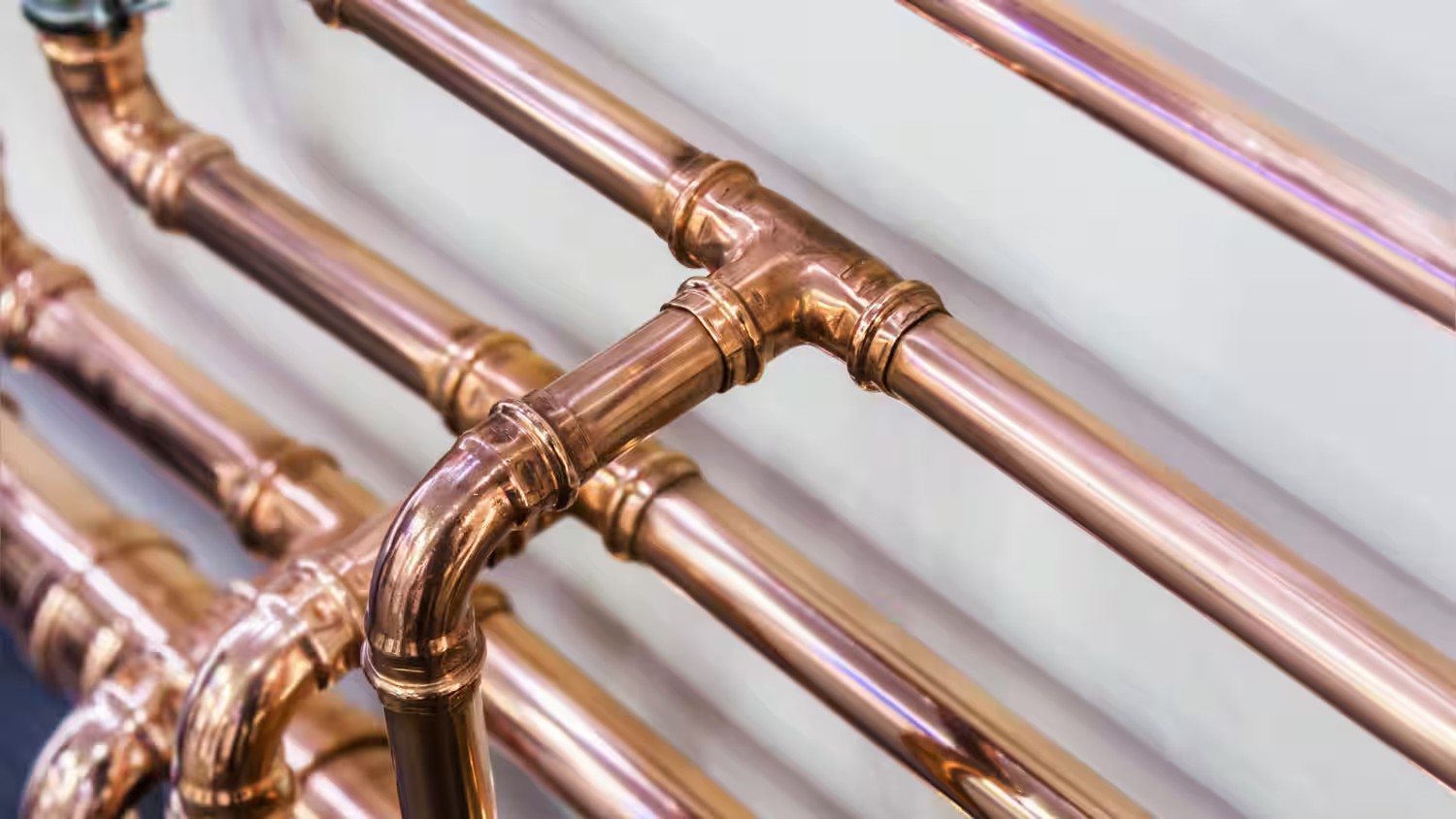Homeowners often face tough decisions when upgrading plumbing systems. Choosing between PEX and copper pipes is a common challenge. Each material offers distinct advantages, especially in Florida’s unique climate. Understanding their differences helps ensure a lasting, cost-effective plumbing solution. Selecting the right option safeguards your home from future repairs. Let’s explore these materials to make an informed decision.
Understanding PEX and Copper Pipes
What is PEX Piping?
PEX pipes are flexible and made from cross-linked polyethylene. Their versatility allows easy installation in tight spaces. They resist corrosion, making them ideal for water systems. These pipes expand slightly under pressure, reducing burst risks. PEX also works well in both hot and cold water lines. Homeowners appreciate its cost-effectiveness and ease of use.
What is Copper Piping?
Copper pipes have been a trusted material for decades. They consist of durable metal that withstands extreme conditions. Copper’s natural antibacterial properties keep water safe to drink. The material resists UV damage, making it ideal for outdoor applications. Its rigid structure ensures long-term reliability. However, copper’s higher cost makes it less accessible for budget-conscious homeowners.
Key Comparison Factors
Durability and Longevity
PEX piping resists chemical exposure and extreme temperatures. Its flexibility prevents cracks during expansion or contraction. Copper pipes withstand heat and maintain their shape over time. Florida’s humidity can accelerate corrosion in older copper systems. Both options last decades with proper installation and maintenance. However, environmental factors may favor PEX in humid areas.
Cost Comparison
PEX piping offers significant savings during installation. Its lightweight nature reduces labor costs and time. Copper requires skilled professionals, which increases expenses. Long-term repair costs are also lower for PEX systems. Copper’s material costs make it more expensive upfront. Budget-conscious homeowners often prefer PEX for its affordability.
Health and Safety Considerations
PEX pipes are BPA-free and safe for potable water. They resist scale buildup, ensuring clean water flow. Copper naturally kills harmful bacteria, enhancing water safety. However, older copper pipes may leach small amounts of metal. Both options meet health standards when installed correctly. Understanding your home’s water quality helps make the best choice.
Suitability for Florida’s Climate
How PEX Performs in Humid and High-Temperature Environments
PEX performs exceptionally well in Florida’s heat and humidity. Its resistance to condensation prevents mold growth. Flexible connections absorb pressure from shifting soil. PEX’s adaptability makes it suitable for hurricane-prone areas. It also reduces noise from water flow, enhancing comfort. These factors make it a reliable choice for coastal homes.
Copper’s Resilience to Florida’s Soil and Water Conditions
Copper resists UV rays and remains durable under intense sunlight. Its rigidity handles pressure well in stable soil conditions. However, Florida’s acidic water can corrode copper over time. Protective coatings help mitigate these issues but increase costs. Homeowners in coastal regions may need regular inspections to ensure longevity.
Challenges of Both Materials in Hurricane-Prone Areas
PEX’s flexibility reduces breakage during ground shifts caused by hurricanes. Copper’s rigidity makes it more prone to damage in these situations. Both materials benefit from proper bracing and secure installation. Professional assessments ensure that pipes withstand severe weather. Choosing the right material depends on location-specific risks.
Installation and Maintenance
PEX Installation: Flexibility and Ease
PEX pipes require fewer fittings, simplifying installation. Flexible tubing allows seamless routing through walls and floors. This reduces labor time and overall costs. Learn more about pipe installation options on our Repiping Your House page. Homeowners can quickly address minor issues with clamp tools. DIY repairs are possible but should follow manufacturer guidelines. Hiring a licensed plumber ensures lasting results.
Copper Installation: Technical Expertise Required
Copper installation demands precise soldering and advanced skills. Professionals use specialized tools to ensure watertight connections. While labor-intensive, copper provides a clean and polished finish. Regular inspections identify potential leaks before major issues arise. Copper pipes benefit from periodic cleaning to prevent buildup. Professional maintenance extends their lifespan.
Energy Efficiency and Sustainability
Thermal Conductivity and Insulation Properties
PEX pipes retain heat efficiently, reducing energy loss in hot water systems. This improves water heater performance, saving energy costs. Copper’s high thermal conductivity can lead to greater heat loss. Insulating copper pipes helps minimize energy waste. Both options provide sustainable solutions with proper installation.
Environmental Impact of Material Sourcing and Recycling
PEX manufacturing uses less energy compared to copper extraction. However, it’s not biodegradable, raising disposal concerns. For energy-efficient solutions, consider tankless water heaters that pair well with PEX systems. Copper is recyclable and retains value after use. Its environmental footprint depends on sourcing practices. Homeowners can prioritize sustainability by recycling old materials. Choosing eco-friendly options benefits the environment and reduces waste.
Common Issues and Troubleshooting
Potential Problems with PEX in Florida Homes
PEX pipes may degrade with prolonged UV exposure. Storing unused pipes indoors prevents this issue. Some connections may require regular checks for leaks. Hard water can cause buildup in fittings over time. Using water softeners reduces these risks. Routine maintenance ensures optimal performance in Florida’s climate.
Common Challenges with Copper Piping
Copper pipes may corrode when exposed to acidic water. Inspecting water quality helps prevent costly damage. Mineral deposits can clog pipes, reducing water flow. Regular cleaning removes buildup and extends pipe life. Replacing older pipes minimizes risks of contamination. Professional plumbers provide tailored solutions for long-term reliability.
Best Practices for Addressing Common Issues
Regular inspections identify minor problems before they worsen. Use approved materials for repairs to ensure compatibility. Advanced leak detection services can also prevent costly water damage. Hiring experienced plumbers avoids improper installations. Maintain water pressure within recommended limits to protect pipes. Addressing issues promptly reduces repair costs and enhances system longevity.
3 Practical Tips for Homeowners
Quick Advice for Maintaining PEX or Copper Pipes in Florida
Inspect your pipes regularly for visible damage or leaks. Protect outdoor pipes with insulation to prevent UV damage. High-quality plumbing fixtures can also enhance durability and efficiency. Use water softeners to reduce mineral buildup in fittings. Replace damaged sections immediately to avoid costly repairs. Schedule annual checkups with a trusted plumbing professional.
Tips for Choosing the Right Contractor
Research local plumbers with verified credentials and reviews. Request estimates from multiple contractors before deciding. Ensure they specialize in the material you choose for installation. Verify licensing to guarantee quality workmanship. Prioritize communication and transparency during the hiring process.
Easy DIY Checks for Pipe Health
Check water pressure to detect hidden leaks early. Inspect pipe joints for signs of wear or corrosion. Flush your system regularly to prevent buildup in pipes. Monitor water clarity to ensure safe and clean supply. Use approved cleaning agents to maintain pipe longevity.
Frequently Asked Questions (FAQ)
What is the average cost difference between PEX and copper pipes?
PEX pipes typically cost less due to affordable materials and faster installation. Copper’s higher material and labor costs increase expenses. PEX saves homeowners money upfront and during repairs. However, copper’s durability may justify its price for some. Budget and long-term needs guide the right choice for your home.
Is PEX piping safe for drinking water in Florida?
PEX pipes meet safety standards for potable water. They resist corrosion and prevent chemical leaching. Their smooth surface reduces bacterial growth within the system. Proper installation ensures safe and clean drinking water. Regular inspections maintain system health and reliability.
How does Florida’s water quality affect copper piping?
Florida’s acidic water may corrode unprotected copper pipes. This increases the risk of leaks and contamination. Using water filtration systems can reduce corrosion and protect your plumbing. Protective coatings and water treatment systems help reduce corrosion. Testing your water quality guides the best maintenance approach. Regular monitoring extends the lifespan of copper pipes.
Can PEX pipes handle high water pressure?
PEX pipes handle high water pressure effectively when installed correctly. Their flexibility absorbs pressure changes without cracking. Use approved fittings to ensure reliable connections. Avoid exceeding manufacturer pressure limits to maintain durability. Routine checks protect your system from unnecessary stress.
Making the Best Choice for Your Home
Selecting between PEX and copper depends on your specific needs and Florida’s conditions. Both materials offer unique benefits for plumbing systems. Consider durability, cost, and climate suitability when deciding. Consult professional plumbers for personalized advice on your project. Choosing wisely ensures a safe and efficient home plumbing system.
References
Design Guide: Residential PEX Water Supply Plumbing Systems
This comprehensive guide from the U.S. Department of Housing and Urban Development provides detailed information on designing and installing PEX water supply systems in residential buildings. It covers design concepts and installation guidelines to promote the proper use of PEX in home plumbing.
Florida Building Code Regulations
The Florida Building Code outlines the state’s regulations for building construction, including plumbing systems. This resource from the Florida Senate details the standards and requirements for materials like PEX and copper in residential plumbing.
National Primary Drinking Water Regulations
The U.S. Environmental Protection Agency provides standards for drinking water quality, including information on contaminants like lead and copper. This resource is essential for understanding the health implications of different plumbing materials.
Monitoring Lead and Copper in Florida Drinking Water
The Florida Department of Environmental Protection offers insights into the state’s efforts to monitor and regulate lead and copper levels in drinking water. This resource highlights the importance of selecting appropriate plumbing materials to ensure water safety.





